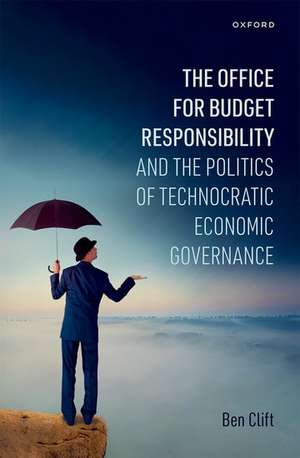The Office for Budget Responsibility and the Politics of Technocratic Economic Governance
Autor Ben Cliften Limba Engleză Hardback – 14 mar 2023
Preț: 586.45 lei
Preț vechi: 715.18 lei
-18% Nou
Puncte Express: 880
Preț estimativ în valută:
112.23€ • 116.74$ • 92.65£
112.23€ • 116.74$ • 92.65£
Carte disponibilă
Livrare economică 24 martie-07 aprilie
Livrare express 07-13 martie pentru 32.89 lei
Preluare comenzi: 021 569.72.76
Specificații
ISBN-13: 9780192871121
ISBN-10: 0192871129
Pagini: 304
Ilustrații: 22 Figures; 1 Table
Dimensiuni: 160 x 240 x 21 mm
Greutate: 0.59 kg
Editura: OUP OXFORD
Colecția OUP Oxford
Locul publicării:Oxford, United Kingdom
ISBN-10: 0192871129
Pagini: 304
Ilustrații: 22 Figures; 1 Table
Dimensiuni: 160 x 240 x 21 mm
Greutate: 0.59 kg
Editura: OUP OXFORD
Colecția OUP Oxford
Locul publicării:Oxford, United Kingdom
Recenzii
Clift's book is an illuminating analysis of the Office for Budget Responsibility. It offers sharp and important insights into the complex statecraft of technocratic economic governance in an age of multiple economic and political crises.
A truly memorable and fantastically well researched contribution to a crucial literature that offers us profound insights into the politicisation, depoliticisation, repoliticisation and attempted re-depoliticisation of economic policy in the UK since the 1990s. Required reading for all students of contemporary British political economy and highly recommended.
Why have economic policymakers been so enamoured with rules and targets since the late twentieth century and yet keep finding ways of getting around them? What are the political implications of the UK government's decades-long love affair with technocratic economic governance? Through his careful analysis of the history of the Office of Budget Responsibility, Clift's book brilliantly answers these and other important questions. He shows us how seemingly neutral technocratic economic forecasts are in fact dependent on a great number of contestable theories, and then demonstrates the profoundly political nature of their different assumptions. This book is a must-read for scholars, students, and engaged citizens who want to understand the pathologies and possibilities inherent in policymakers' efforts to forecast an increasingly uncertain economic future.
This is an outstanding book, a major work of scholarship on a neglected subject. Through its detailed study of the OBR it makes an important argument about the nature and limits of technocratic governance. The attempt by the Truss Government to sideline the OBR (with disastrous results) makes the analysis more relevant than ever.
A truly memorable and fantastically well researched contribution to a crucial literature that offers us profound insights into the politicisation, depoliticisation, repoliticisation and attempted re-depoliticisation of economic policy in the UK since the 1990s. Required reading for all students of contemporary British political economy and highly recommended.
Why have economic policymakers been so enamoured with rules and targets since the late twentieth century and yet keep finding ways of getting around them? What are the political implications of the UK government's decades-long love affair with technocratic economic governance? Through his careful analysis of the history of the Office of Budget Responsibility, Clift's book brilliantly answers these and other important questions. He shows us how seemingly neutral technocratic economic forecasts are in fact dependent on a great number of contestable theories, and then demonstrates the profoundly political nature of their different assumptions. This book is a must-read for scholars, students, and engaged citizens who want to understand the pathologies and possibilities inherent in policymakers' efforts to forecast an increasingly uncertain economic future.
This is an outstanding book, a major work of scholarship on a neglected subject. Through its detailed study of the OBR it makes an important argument about the nature and limits of technocratic governance. The attempt by the Truss Government to sideline the OBR (with disastrous results) makes the analysis more relevant than ever.
Notă biografică
Ben Clift is Professor of Political Economy in the Department of Politics and International Studies at the University of Warwick. His research and teaching interests integrate comparative and international political economy. He received his PhD from the Sheffield University in 2000. Before joining Warwick, he held lectureships at Sheffield and Brunel Universities. He has been research fellow at Sciences-Po, Paris and the University of Oxford. In 2018 he won a prestigious Leverhulme Major Research Fellowship. He has published widely on comparative capitalisms, the IMF, the politics of economic ideas, and the political economy of economic patriotism in many leading journals.
